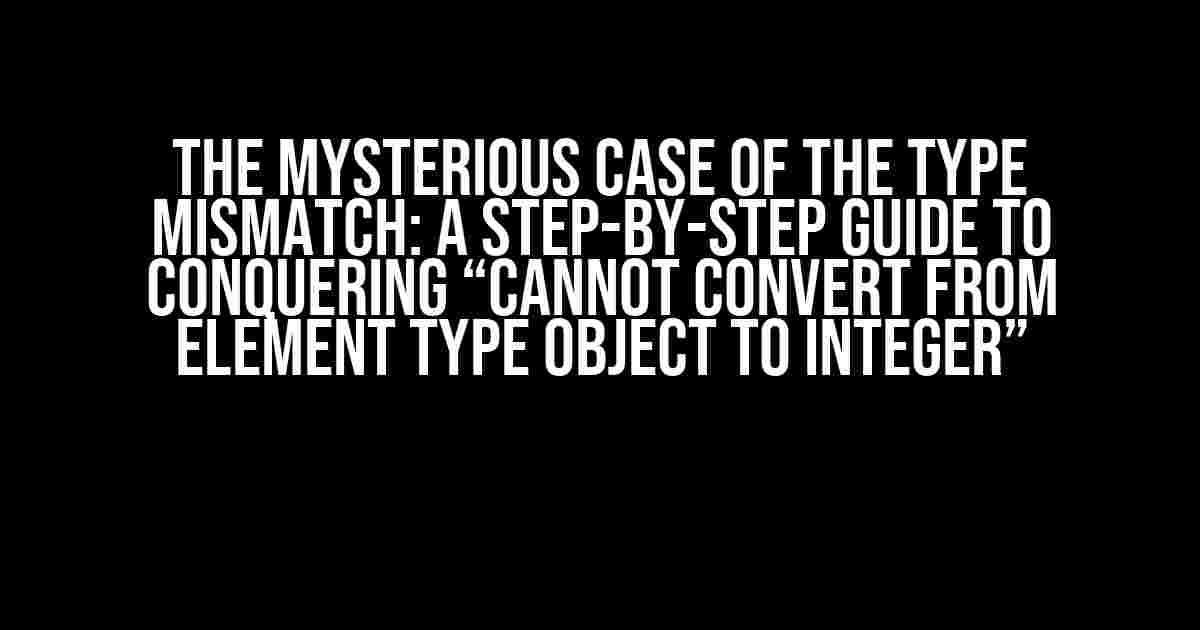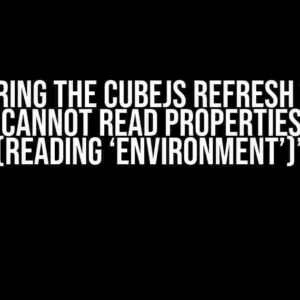Have you ever encountered the frustrating error message “cannot convert from element type Object to Integer” in your Java code? Don’t worry, you’re not alone! This infamous Type Mismatch error has puzzled many programmers, causing them to scratch their heads and wonder what went wrong. Fear not, dear coder, for we’re about to embark on a thrilling adventure to vanquish this pesky error and uncover the secrets of type conversions.
Understanding the Error Message
Before we dive into the solutions, let’s take a closer look at the error message itself. “Cannot convert from element type Object to Integer” is a clear indication that Java is complaining about an invalid type conversion. But what does this mean, and why is it happening?
The Role of Generics in Java
In Java, generics allow us to create reusable code that can work with different data types. When we define a generic class or method, we specify the type parameter(s) in angle brackets, like `
<E> public class MyClass<E> {
private List<E> myList;
public MyClass(List<E> list) {
this.myList = list;
}
}
The Object-Integer Conundrum
Now, when we try to convert an Object to an Integer, Java gets confused. This is because Object is a superclass of all classes in Java, including Integer. However, when we use a raw type (e.g., `List` instead of `List
Solutions to the Type Mismatch Error
Enough theory! Let’s get to the good stuff – solving the error. We’ll explore three common scenarios that lead to the “cannot convert from element type Object to Integer” error and provide step-by-step solutions to overcome them.
Scenario 1: Raw Types and Generic Methods
Imagine we have a generic method that takes a list of integers as an argument:
public <E> void processList(List<E> list) {
for (E element : list) {
// Do something with element
}
}
But, when we call this method with a raw list, Java gets confused:
List myList = new ArrayList(); myList.add(1); myList.add(2); myList.add(3); processList(myList); // Boom! Type Mismatch Error
Solution:
- Use parameterized types: Change the method signature to use a parameterized type, like `List
`. - Update the method invocation: Pass a parameterized list, such as `List
myList = new ArrayList ()`.
public void processList(List<Integer> list) {
for (Integer element : list) {
// Do something with element
}
}
List<Integer> myList = new ArrayList<Integer>();
myList.add(1);
myList.add(2);
myList.add(3);
processList(myList); // Voilà! No more error
Scenario 2: Object-to-Integer Casting
In some cases, you might need to cast an Object to an Integer explicitly. However, this can lead to the Type Mismatch error if not done correctly:
Object obj = 5; Integer integerValue = (Integer) obj; // Okay, but beware!
Solution:
- Use the correct casting syntax: Ensure you’re casting to the correct type, and Java will handle the conversion.
- Handle potential ClassCastExceptions: Always check if the Object can be cast to the desired type using the `instanceof` operator.
Object obj = 5;
if (obj instanceof Integer) {
Integer integerValue = (Integer) obj;
// Use integerValue
} else {
System.out.println("obj is not an instance of Integer");
}
Scenario 3: Legacy Code and Raw Types
Legacy code can be a breeding ground for Type Mismatch errors. Suppose we have an old method that returns a raw List:
public List getNumbers() {
List list = new ArrayList();
list.add(1);
list.add(2);
list.add(3);
return list;
}
Solution:
- Update the method return type: Change the return type to `List
` to specify the type of elements. - Use a parameterized type in the method body: Ensure that the list is parameterized with `Integer`.
public List<Integer> getNumbers() {
List<Integer> list = new ArrayList<Integer>();
list.add(1);
list.add(2);
list.add(3);
return list;
}
Best Practices to Avoid Type Mismatch Errors
Now that we’ve conquered the Type Mismatch error, let’s discuss some best practices to avoid it in the future:
- Use parameterized types: Always specify the type parameter(s) when creating a generic class or method.
- Avoid raw types: Never use raw types (e.g., `List` instead of `List
`) in your code. - Handle legacy code with care: When working with legacy code, take the time to update raw types to parameterized types.
- Casting with caution: Always check the type of an Object before casting it to a specific type using the `instanceof` operator.
- Java 7’s Diamond Operator: Take advantage of the Diamond Operator (`<>`) to simplify generic type inference.
Conclusion
The Type Mismatch error “cannot convert from element type Object to Integer” can be frustrating, but it’s a common pitfall that can be easily overcome. By understanding the root cause of the error, using parameterized types, and following best practices, you’ll be well on your way to writing robust, error-free code. Remember, with great power comes great responsibility – use generics wisely!
| Error | Solution |
|---|---|
| Raw types and generic methods | Use parameterized types, and update method invocations |
| Object-to-Integer casting | Use correct casting syntax, and handle potential ClassCastExceptions |
| Legacy code and raw types | Update method return types, and use parameterized types in method bodies |
Now, go forth and conquer the world of Java programming, free from the shackles of Type Mismatch errors!
Frequently Asked Question
Here are some answers to common questions about the infamous “Type mismatch: cannot convert from element type Object to Integer” error!
What is this error, and why is it haunting me?
This error occurs when you’re trying to convert an Object type to an Integer type, but Java is all like, “Nah, I don’t think so!” It’s usually because you’re trying to iterate over a collection or array that’s not explicitly typed, and Java can’t guarantee that the objects inside are actually Integers. So, it throws this error to prevent any potential runtime issues.
How do I fix this error? Is there a magic spell?
Sadly, no magic spell can fix this error. However, you can try casting the Object to an Integer explicitly, like this: `Integer myInt = (Integer) myObject;`. But be careful, because if the Object isn’t actually an Integer, you’ll get a ClassCastException at runtime. A better approach is to use generics and ensure that your collection or array is properly typed from the start.
Can I just use raw types and ignore the warnings?
Technically, yes, you can use raw types and ignore the warnings. But don’t do that! Raw types are a relic of the past, and using them can lead to all sorts of issues, including this error. By using generics, you can ensure type safety and avoid runtime errors. So, take the time to fix the warnings and use proper generics.
What if I’m using an older version of Java that doesn’t support generics?
If you’re stuck with an older version of Java, you might not have access to generics. In that case, you’ll need to use raw types and casting, but be extremely careful to ensure that you’re not trying to convert an Object to an Integer when it’s not actually possible. You can also consider upgrading to a newer version of Java, which would be a good idea anyway!
Is there a way to avoid this error in the first place?
Yes, you can avoid this error by being mindful of your collection and array typing from the start. Use generics and ensure that your collections and arrays are properly typed. This will help Java know exactly what types of objects are inside, and you’ll avoid this error altogether. It’s all about writing clean, type-safe code from the beginning!





